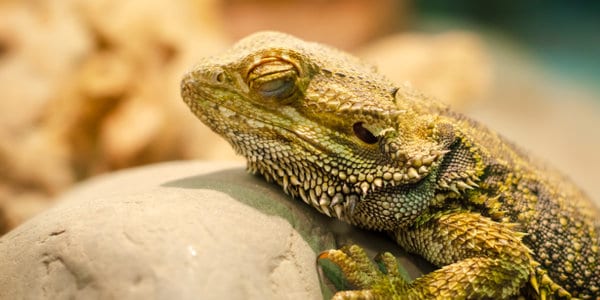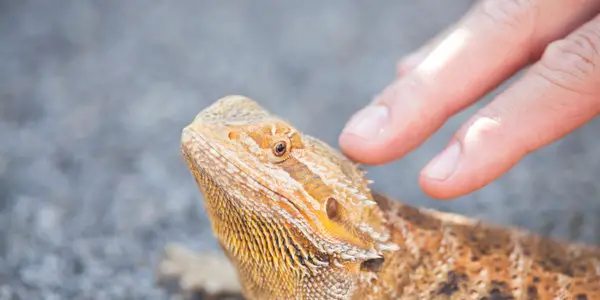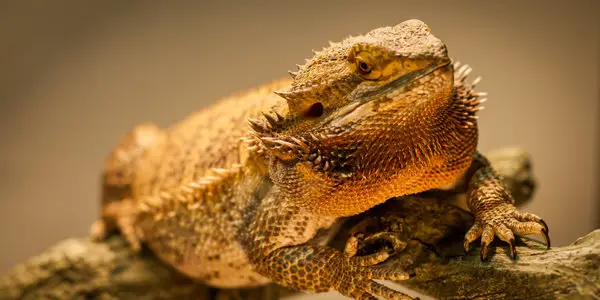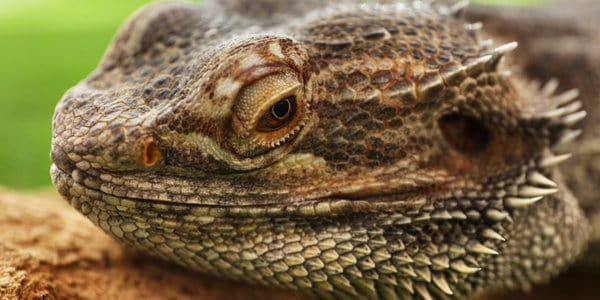Bearded dragons often close one eye in normal conditions, therefore there’s no reason to fear. However, there are instances where a beardie closes one eye consistently to signal a serious underlying issue.
Fortunately, you can resolve some of the issues causing your reptile pet to close one eye while leaving the other open before or without taking them to the vet.
So, why does a bearded dragon close one eye often and leave the other open? Amongst the various reasons bearded dragons consistently close one eye include dehydration, skin shedding issues, presence of foreign objects in the eye, and incorrect lighting setup. Further, a bearded dragon might continually close one eye due to infestation by parasites, imbalanced levels of humidity, response to stimuli, infection or disease, and /fright. Then again, your pet lizard could just be, sunbathing.
We will be discussing these reasons, their causes and treatment where applicable. It is necessary to know which one is resulting to your beardie closing one eye repetitively and whether it is anything to be alarmed about.
The well-being of your bearded dragon is very important so it is important to consult your pet’s local vet in case you are worried.
Besides, bearded dragons are wonderful and hardy exotic reptiles but they still need to get the best care and attention to thrive.
Why Does My Bearded Dragon Close One Eye?
1. Dehydration
In response to lack of enough water, your bearded dragon may close one of their eyes. Other common signs that depict a dehydrated beardie are lethargy and sunken eye sockets caused by lesser fluids in the eyes.
You may not know when these reptiles really need water since they rarely drink it.
But behaviors like closing one eye while leaving the other eye open should help you know. Note: Dehydration can be fatal to any animal, including your bearded dragon.
Just to be sure, try pinching their skin; if it bounces back, they are well hydrated, if it takes a little bit longer to bounce back to normal, they are possibly dehydrated.
Luckily, you can easily stop your beardie friend from closing one eye consistently by preventing dehydration. Check the amount of water they have in the bowl, and ensure it is clean and sufficient.
On top of this, ensure the light they are getting is appropriately placed- not too high or too low. In case your beardie is already dehydrated, don’t fret.
Move speedily to rehydrate your pet by bathing them in fresh warm water about three times in a week.
Moreover, placing a few drops of clean drinking water in their mouth might stimulate the lizard to drink more water.

2. Skin Shedding Issues
Beardies experience several skin sheds in a year, some successful others not so much. These dragons rub their bodies against objects to assist in the shedding process.
Nevertheless, the areas around their eyes are the most difficult to shed. So, if you notice your bearded dragon closing one of its eyes and it has been undergoing a shed, look carefully around the eyes for any stuck shed.
The best way to help remove the stuck shed is to soak a piece of cotton wool in warm water. Once it is properly soaked and its temperature nice, place the cotton pad on the affected eye and allow it to sit for a while.
Once the skin around the eye has absorbed enough water and softened, gently help remove the stuck shed by rubbing the cotton pad off of the eye.
It is crucial to keep any sharp objects away from their tank as such objects can easily pierce and harm your pet’s eyes.
3. Foreign Objects in the Eye
Decoration items or any other sharp objects placed in your bearded dragon’s enclosure could also injure your pet. For instance, a broken branch with an exposed sharp edge could potentially injure your beardie.
When a beardy is scratching its body against these objects, it may accidentally scratch into the eye and puncture the cornea.
As a result, be bearded dragon might end up closing the affected eye while the one stays open.
On top of scratching and punctures, anything from loose substrate, dirt, or debris could get stuck in your bearded dragon’s eye.
In an attempt to try to remove the foreign object from the eye, your bearded dragon’s eye might bulge out of its head while the other eyes stays shut.
If your beardie’s eye has been affected or you are suspecting a foreign object is in its eye, you can buy reptile eye drops. They contain antibacterial properties that treat eye infections and clean the eye.
Nonetheless, be cautious not to use tap water to rinse your bearded dragon’s eye since it is not sterile and could cause more infectious damage.
Instead, use saline eye rinse to sooth the eye and treat the infection until it’s gone. Moreover, make a habit of cleaning your bearded dragon’s tank regularly to get rid of dirt, loose substrate, or any sharp objects.
Additionally, the use of a reptile carpet is a great way to prevent to reduce such eye injuries in captive beardies.

4. Incorrect Lighting
Bearded dragons require large cages that are sufficiently lit. Therefore, your beardie might be closing one eye consistently as a sign of an improperly lit tank.
The recommended UVB output should range from 10.0 to 12.0 depending on the size of the enclosure.
Though coiled bulb lighting is great for plants, it differs in the case of bearded dragons. Tube lighting is the best for your beardy. So, your beardie’s cage should be big enough to allow tube installation.
Furthermore, the ultimate UVB lights for a bearded dragon’s tank contain the capability to be oriented either vertically or horizontally.
In turn, the UVB emissions present a reliable remedy for metabolic bone disease (MBD) while the UVA promotes mating and feeding behaviors in your pet beardie.
5. Parasites
Mites or ticks often infest bearded dragons in the wild. These mites stay on the reptiles for safety and feeding. Once they are satisfied they move elsewhere.
In captivity, the parasites overstay on skins of bearded dragons. If you notice your beardy depicting behaviors like frequently closing one eye, check for small black or red spots around the reptile’s eyes or ears.
Some parasitic organisms are tiny, thus difficult to spot while others are extremely good at camouflaging and hiding.
So, upon suspicion that your beardy is infested, consult an experienced vet for proper diagnosis and treatment.
Parasites are known to transmit threatening illnesses to their host which causes health problems afterwards.
6. Imbalanced Humidity Level
A bearded dragon can also close one of its eyes consistently in response to exceptionally low humidity.
The optimal humidity reading for a bearded dragon ranges from 30% – 40%. Higher or lower humidity can disrupt a bearded dragon’s thermoregulation and cause diseases.
Low humidity brings about abnormal shedding of the skin in bearded dragons (dysecdysis). In such a case, a beardie often closes one eye to aid with the shedding.
On the other hand, elevated humidity causes blistering of the skin, bacterial infections and respiratory diseases.
In most cases, this condition is intolerable for your beardie and you might need to consult a professional reptile pet vet immediately to prevent more damage and potential death.
It is extremely important to regularly check the humidity levels in the bearded dragon’s enclosure.
One can maintain the correct humidity levels with the aid of a Reptile Hygrometer, which sounds an alert when the humidity is outrageous.
To raise the level of humidity, add an extra water bowl in the hot spot of the cage. While the water evaporates, humidity levels rises.
Also, when you spray mist branches and plants in the enclosure, the moisture retained helps to elevate humidity levels. Nevertheless, excessive moistening leads to molding.
On the other hand, if the humidity level is too high, simply use a fan to lower it. Take care to switch off the fan when the humidity level is stabilized.

7. Response to Stimuli
Bearded dragons often close one eye while the other remains open as a natural trait. If your pet lizard is simply responding to stimuli in their habitat, then there is nothing to be concerned about.
After all, your beardie could just be trying to focus better during feeding when the food is a distance away.
Similar to humans, bearded dragons often close one eye when they want to focus and see clearly. Particularly, beardies mostly close one eye in an attempt to focus on prey that’s some distance away.
8. Infection or Disease
When a bearded dragon’s eye contracts a viral or bacterial infection, it can fall ill either inside or outside.
In response to the irritation, pain, or discomfort caused by the illness, your lizard is likely to keep closing the affected eye.
Moreover, you can easily identify infected bearded dragon eyes as they’re usually swollen, and often ooze discharge.
In an attempt to safeguard the affected eye tissues, the dragon is likely to close the infected eye.
Then again, sometimes your beardie’s eye may not swell even though it has an infection. Instead, you may observe that your beardie keeps closing the eye all through the day.
9. Fright
Like humans, bearded dragons tend to close their eyes when something comes near them. You may notice the dragon closing the eye on the side you are petting.
This shows that your dragon is afraid that you might poke and harm their eye with your fingers.
Later, you might see your beardie opening its eye back up when you start petting it a safe distance from the eye. Fortunately, you have nothing to worry about as this is simply a natural response to your touch.
10. Sunbathing
Since bearded dragons are cold blooded creatures, they cannot be able to regulate their bodies to the correct temperatures without the help of sunlight.
There’s no doubt that beardies are fond of basking in the sun in the cool morning hours.
Additionally, beardies bask during the day to absorb heat and balance their body temperature. At such times, your beardie might close one or both eyes while basking to protect them from strong ultraviolet sun-rays.
Sometimes, bearded dragons bask the whole day to maintain the appropriate body temperature for survival.
However, captive beardies usually spend most of their time indoors (in their tank). Thus, it’s paramount that you provide them with the appropriate lighting setup to substitute the natural sun.
Still, you might observe your pet beardie closing one eye as they bask under the basking lights in their tank. In such cases, it’s only a natural instinct to shield the eye from the asking light, thus nothing to worry about.

Conclusion
Bearded dragons are popular for numerous peculiar traits and closing one eye is one of them.
However, a beardie might consistently open one eye while keeping the other closed for a range of reasons such as dehydration, incorrect lighting, unsuitable humidity levels, and infections.
Moreover, your beardie could be keeping one eye open due to foreign objects such as parasites irritating the eye.
In addition, they can close one eye in response to touch or improper lighting. On the other hand, your dragon could be closing one eye when they’re frightened.
Whatever the case, carefully observe your beardy to determine the reason it’s portraying this interesting behavior.
It’s highly recommended to counter-check the reptile’s environment and make the necessary changes.